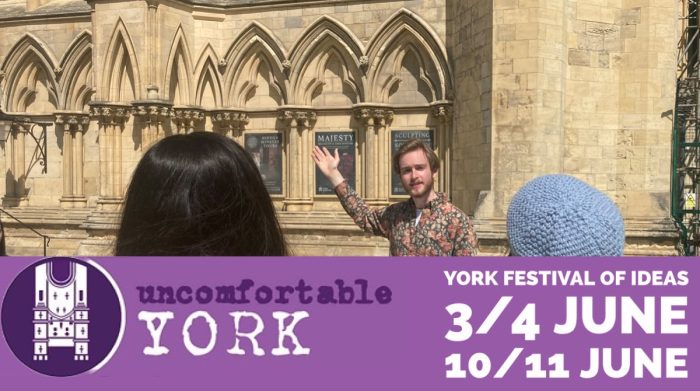York is a stunning city regardless of the season, but in the clear skies, the magnificence and beauty of York Minster was at its best, as we, a group of postgraduate and undergraduate History students, and a representative from Visit York who studied at UOY in the eighties, gathered besides the statue of the Roman Emperor Constantine.
It was a gloriously sunny day on Saturday 27th of May, and we were embarking on a 90 minute test-tour of the city to discuss “uncomfortable” aspects of York’s history and how shady elements of the past lie behind the physical beauty of its buildings.

The Uncomfortable York Tour is a project that’s being launched by a group of ex and current postgraduates at the University of York who specialise in Public History. It’s part of the Uncomfortable Cities scheme, which is an emerging initiative being established in British cities as an extension of Uncomfortable Oxford Ltd. In recent years, given the #BLM movement and the aftermath of the pulling down of the Edward Colston statue in Bristol in June 2020, conversations about colonial legacies in British history are extremely prevalent.
We as historians have felt an obligation to navigate these discourses by trying to ensure productive outcomes, ensure these histories are not suppressed by the government, corporations or other elites, whilst also ensuring difficult history is acknowledged rather than erased.

Acknowledgement was a big theme of discussions around the tour, which started off at York Minster, then going to sites of York’s chocolate heritage, before finishing in the Executions Square in Tower Gardens by Clifford’s Tower. These tours are specifically designed to encourage discussions amongst the group as to how we go about addressing the nature of our history and how we change things for the future. Managed superbly by our three guides (Charlie, and two postgrad interns, Esme Boore and Sophia Nicol), discussions were free-flowing, provocative and involved all of the group.
To many, York is not a city with obvious colonial links. It is not a port city like London, Liverpool or Glasgow. But by walking between some of York’s greatest monuments, under the surface these colonial stains become quickly too noticeable to ignore. For example, as part of the Church of England, the York Minster has profited from the Slave Trade, and the Church was one of the major beneficiaries of the compensation payments made by the state after the abolition of slavery in 1833. The Minster is one of the most visually stunning ecclesiastical sites in England, but how much of its upkeep in, particularly the Early Modern Period, was possible because of Church profiteering in slavery remains to be established.
Another key focus of the tour was York’s Chocolate heritage, something which the city proudly promotes and is a key factor behind the 8.4 million tourists that visit each year. But as we walk round various sites, plenty of uncomfortable subjects arise, particularly around the colonial importation of sugar, conditions on farms in both the past and the present, and how much of these heritage tours are restricted by what Nestlé, who own’s Rowntree’s, wants us to know.
How are influential female York chocolatiers, such as Mary Craven, portrayed in these official company narratives, how are the lives of ordinary workers (both in York and abroad) portrayed? These are some of the questions which bring to light these aspects usually ignored in the positively-spun tours currently offered in the city.
And why does these issues matter to University students especially? Well, even if we don’t decide to live in and around York once we finish our degrees, we are a beating part of the city whilst studying here. We live, we eat, we study (and let’s not forget) party in York. Partaking on tours such as these are a way of developing a deeper knowledge with the city and perhaps even obtaining a closer connection. When University buildings and colleges are named after Constantine, Seebholm Rowntree etc. it is important for studies to be aware of a fuller history behind the names appearing across the University.
Ultimately, this tour was an immensely thought-provoking and educational experience. The people behind it, with the support of the Rowntree Society and the University’s Institute for the Public Understanding of the Past, are doing a great job at sensitively handling these controversial and dark aspects of York’s past. There was recognition of suppressed voices in these narratives and an effort to detoxify public debate around our national as well as local legacies. This will help everyone realise the continuations of such events in the present day, be they accusations of antisemitism at the University, neocolonialism in the Global South by corporations like Nestlé, or the continued state suppression of our imperial legacies at schools. Hopefully, when the tours go ahead, they well help build a better future by encompassing greater awareness of our past.
Charlie Cayzer, the Research & Development Officer, gave Vision the following comment:
“Our heritage tours seek to encourage discussion about uncomfortable histories and issues within British cities. Our directors started in Oxford in 2018, with tours that address legacies of elitism and racism, and we’re now expanding across the UK.
We’re thrilled to be launching our tours in partnership with the York Festival Of Ideas 2023 Programme. We’ll be running free tours for the public on Saturdays 3rd, Sunday 4th, Saturday 10th and Sunday 11th June.
We’re hoping to set-up regular tours later in the summer, for which we’ll be recruiting new guides. Keep your eyes peeled for our advertisements!”
You can find details about the Uncomfortable York tour here on the University website, their own website or follow them on Instagram, Facebook, Twitter and TikTok.
